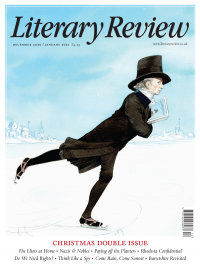Stuart Isacoff
Piano Man
Mozart: The Reign of Love
By Jan Swafford
Faber & Faber 832pp £30
There is no lack of published biographical material on Johannes Chrysostomus Wolfgangus Theophilus Mozart (1756–91), the singular musical genius who put the piano concerto on the map, birthed some of the greatest operas in the repertoire and left behind him a stream of glorious melodies. He was also, from the evidence of his letters, uncouth and childish to the end. Accounts of his short life and his music have ranged from Maynard Solomon’s psychological profile and Jane Glover’s exploration of ‘Mozart’s women’ to Hermann Abert’s hefty biography, which is based on the classic 19th-century work of Otto Jahn and filled with historical detail and perceptive music analysis.
Mozart’s story is that of a sensitive soul with freakish talent who displayed his gifts early on, performing on the keyboard at royal courts with his sister while still a child. He was buffeted by ill fortune, sickness and an overbearing father incessantly chasing after rewards from uncaring patrons. One

Sign Up to our newsletter
Receive free articles, highlights from the archive, news, details of prizes, and much more.@Lit_Review
Follow Literary Review on Twitter
Twitter Feed
It wasn’t until 1825 that Pepys’s diary became available for the first time. How it was eventually decrypted and published is a story of subterfuge and duplicity.
Kate Loveman tells the tale.
Kate Loveman - Publishing Pepys
Kate Loveman: Publishing Pepys
literaryreview.co.uk
Arthur Christopher Benson was a pillar of the Edwardian establishment. He was supremely well connected. As his newly published diaries reveal, he was also riotously indiscreet.
Piers Brendon compares Benson’s journals to others from the 20th century.
Piers Brendon - Land of Dopes & Tories
Piers Brendon: Land of Dopes & Tories - The Benson Diaries: Selections from the Diary of Arthur Christopher Benson by Eamon Duffy & Ronald Hyam (edd)
literaryreview.co.uk
Of the siblings Gwen and Augustus John, it is Augustus who has commanded most attention from collectors and connoisseurs.
Was he really the finer artist, asks Tanya Harrod, or is it time Gwen emerged from her brother’s shadow?
Tanya Harrod - Cut from the Same Canvas
Tanya Harrod: Cut from the Same Canvas - Artists, Siblings, Visionaries: The Lives and Loves of Gwen and Augustus John by Judith Mackrell
literaryreview.co.uk